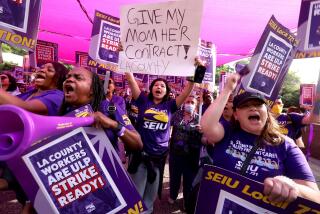Proposed merger of California healthcare union locals draws intense protest
The presidential election has come to an end, but a stormy political battle of another sort is in high gear in labor circles, with long-ranging consequences for California healthcare workers.
At issue is whether as many as 300,000 employees now represented by three separate local unions across the state will be rolled into one enormous local, a proposal that was put to a nonbinding vote of members on Monday.
At the same time, the Service Employees International Union wrapped up hearings this week into allegations that leaders of one of those locals misused dues, creating a secret war chest to fight the merger.
Both sides say the outcome will affect patients because many concessions the unions fight for -- such as workloads -- affect quality of care.
Some within SEIU say the proposed megalocal would be too big and unresponsive -- most loudly the heads of the United Healthcare Workers West, the subject of the trusteeship hearings and a local that would either be reduced by half or swallowed completely in the merger. They claim that their parent union’s real motivation is to squelch dissent and that they will be ousted either by consolidation or trusteeship, replaced by pliant appointees.
“This is an unprecedented war by an international union against a local,” Sal Rosselli, president of UHW, said outside the hearing room at the San Jose convention center. The rift has become so ugly that guards were hired to stand at the door.
Rosselli and other officers have waged a sophisticated opposition campaign, circulating petitions, courting public officials and the media, running a website complete with video and blogs, and staging large protests outside meeting halls and union offices -- including one in Los Angeles this month. They have also sent mailers to members, urging a boycott of the merger vote.
UHW has won allies, including at least one with celebrity status in labor circles: Dolores Huerta, who with Cesar Chavez founded the predecessor to the United Farm Workers union. She testified on UHW’s behalf and sponsored a fundraiser in San Francisco last week, pulling together $240,000 for the group’s legal costs.
The SEIU denies that the proposed merger is an effort to unseat Rosselli or others, calling it part of a years-long process to consolidate locals around the country. SEIU President Andy Stern said consolidation gives members more heft in negotiating with international corporations and state governments and makes it easier to organize more workers.
“It’s not to be bigger for bigger’s sake,” said SEIU spokeswoman Michelle Ringuette. “It’s to make our members’ voices stronger.”
Dozens of locals have already merged to create larger groups. All three of the unions subject to the current merger vote -- Oakland-based UHW, San Jose-based SEIU 521 and Los Angeles-based SEIU 6434 -- had already grown due to prior mergers.
As for the internal trusteeship hearing, SEIU officials say it’s a separate matter.
Officials of the international union accused UHW of lying about the purpose of its $3-million United Health Care Workers and Patients Education Fund. They claim the money was meant to fight efforts to dissolve the muscular 150,000-member local.
UHW insists that the fund was meant for a political campaign dealing with healthcare, but acknowledges that the local spent $100,000 to publicize UHW’s internal vote, where its members strongly opposed being swallowed by another union.
A hearing officer’s report is expected in January.
The international’s merger vote ends Dec. 11. It asks members whether they would prefer a 300,000-member local representing all SEIU-affiliated California healthcare workers, or a slightly smaller 220,000-member local representing long-term healthcare workers. The status quo is not an option.
The results of the vote will not be binding -- the international’s board will decide whether and how to restructure California’s healthcare unions, and SEIU officials would appoint the leadership. An SEIU report released earlier this year recommended the larger consolidation.
“Either option as they’re proposing it would eliminate UHW as we know it,” said John Borsos, a UHW executive.
SEIU 6434, an already giant 160,000-member local representing home health aides, would dissolve into the new local under either plan. John Ronches, who was appointed trustee of that local this year after The Times exposed financial improprieties by its former leader, said his members are looking forward to the merger.
“Every time there’s an issue, there’s three different operations that have to be put into gear. It just makes more sense if it’s centralized,” he said. “Our members get that. They want to be in the same union.”
The third union, SEIU 521, represents about 40,000 public employees and another 13,000 home care workers in and around the Silicon Valley. It also would be peeled off under either scenario.
Some SEIU 521 members spoke out against a merger at a 2006 hearing, wearing purple T-shirts with the slogan “If it ain’t broke, don’t fix it.”
Kristy Sermershiem, president of SEIU 521, said that, given the current choices, aides in her union -- who make $11.50 and $12.25 an hour -- prefer the smaller merger.
“You win some, you lose some. Right now we’re being asked which of the choices do we want,” she said. “We’re very disappointed that UHW has decided to make such a big deal about it when the real issue is how do you organize workers so they have a voice.”
Larrubia is a Times staff writer.
More to Read
Sign up for Essential California
The most important California stories and recommendations in your inbox every morning.
You may occasionally receive promotional content from the Los Angeles Times.










